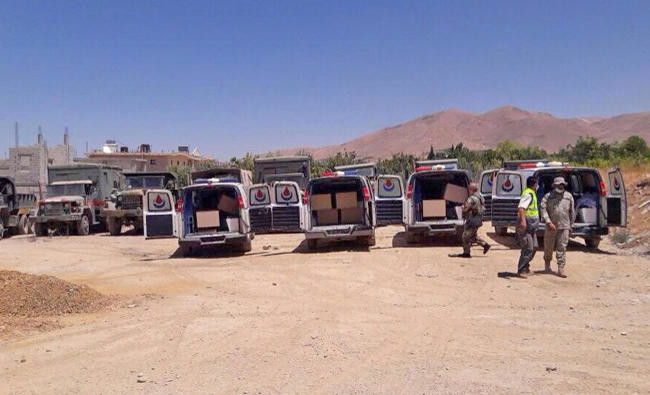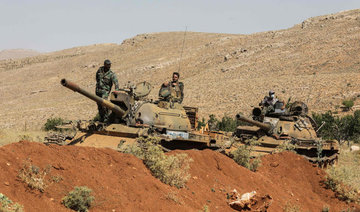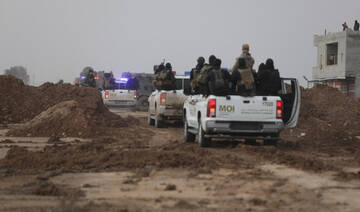BEIRUT: The bodies of 14 fighters have been exchanged in northeast Lebanon under a cease-fire agreement between Hezbollah and Jabhat Fateh Al-Sham (JFS) militants.
The exchange included nine JFS fighters, and five Hezbollah fighters, including three killed in recent battles in Lebanon, and two killed two years ago in Syria, according to Hezbollah’s military media.
Hezbollah carried the bodies of the JFS militants in wooden coffins, transported in its ambulances to the headquarters of the Lebanese Armed Forces 9th Brigade near Arsal.
The National News Agency (NNA) reported that “the bodies of the JFS fighters were transferred from the Lebanese army barracks to a hospital in Hermel, to be placed in the hospital corpse refrigerators after medical examination, and … remain in the refrigerator until the deal is completed.”
Meanwhile, Lebanese Red Cross ambulances were waiting for the approval to enter the Wadi Hmeid region, which is outside the control of the Lebanese army, to transport the five Hezbollah fighters’ bodies.
Hezbollah’s military media reported that the delay in handing over the bodies of Hezbollah fighters was due to logistical factors, and the time needed to confirm the identity of the two Hezbollah fighters.
It is understood that the JFS militants will not carry the bodies they have retrieved from Hezbollah in convoys to Idlib. An authorized source from one of the refugee camps said that they will bury the bodies in a cemetery dedicated for displaced Syrians in Arsal.
The exchange between the two parties also included the handover of a Syrian woman, Mayada Alloush, who had been detained by the Lebanese military court, a Lebanese judicial source told Arab News.
The same source said that Alloush was arrested months ago on charges of transferring funds to JFS, which was formerly known as Al-Nusra Front and had been linked to Al-Qaeda.
Rima Karnabi, the deputy mayor of Arsal, told Arab News that Alloush, an activist from Al-Qusayr in Syria, used to visit Arsal frequently.
The exchanges on Sunday were part of the first phase of a local cease-fire agreement between Hezbollah and JFS in the barren and mountainous areas close to the Lebanese-Syrian border.
The second phase is expected to consist of moving militants and displaced people from camps in Arsal to Idlib in Syria.
Bassel Al-Hujairi, the mayor of Arsal, told Arab News that the first convoy of JFS militants and their families will head toward Idlib early on Monday morning led by JFS leader Abu Malek Al-Talli.
According to the NNA, the number of those wishing to leave the Syrian camps in Arsal and surrounding barren areas amounts to 10,700 militants and civilians.
The agency said the JFS gave the Lebanese security and international committees the names of 7,800 people wishing to go to Idlib.
According to a representative of the Union of Relief and Development Associations, 3,500 militants from Saraya Ahl Al-Sham are leaving as they had nothing to do with the cease-fire agreement, because they had refrained from fighting Hezbollah and were not classified by the Lebanese army as terrorists.
Hezbollah, militant group exchange bodies of 14 killed in Arsal fighting
Hezbollah, militant group exchange bodies of 14 killed in Arsal fighting

Flash floods in Syria kill 1 volunteer, trap civilians and block roads

- Five volunteers suffered moderate to severe injuries, including one who was injured while attempting to rescue a child trapped in floodwaters
LONDON: Flash floods caused by heavy rainfall in northern and western Syria have resulted in the death of a volunteer with the Syrian Arab Red Crescent and have injured several others during rescue operations in the Latakia countryside on Sunday.
Volunteer Samiha Rakhamieh was killed when her vehicle slid into a valley in Jabal Al-Turkman while responding to flood emergencies. Five volunteers suffered moderate to severe injuries, including one who was injured while attempting to rescue a child trapped in floodwaters, according to the Syrian Arab News Agency.
On Saturday, two children lost their lives, and a third was rescued after severe flooding swept through the Ain Issa area in the northern Latakia countryside.
Heavy rains in northern and western Syria have caused flash floods, inundating tents in camps near Idlib and prompting emergency evacuations. Flooding in the Latakia countryside has trapped civilians and blocked roads, authorities reported.
















